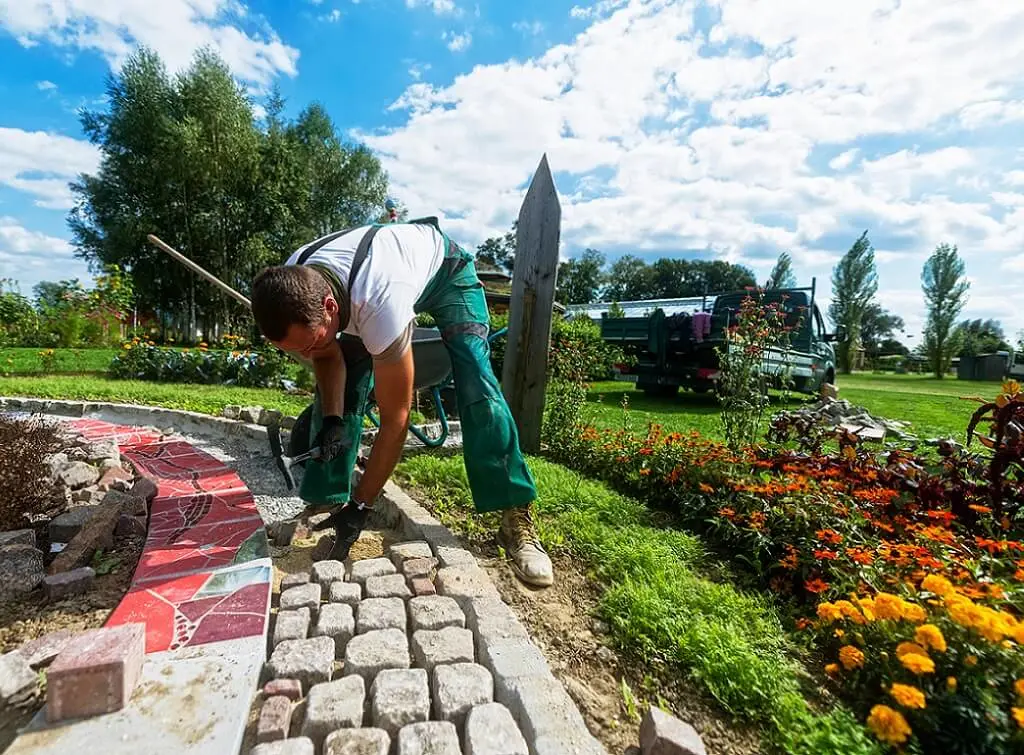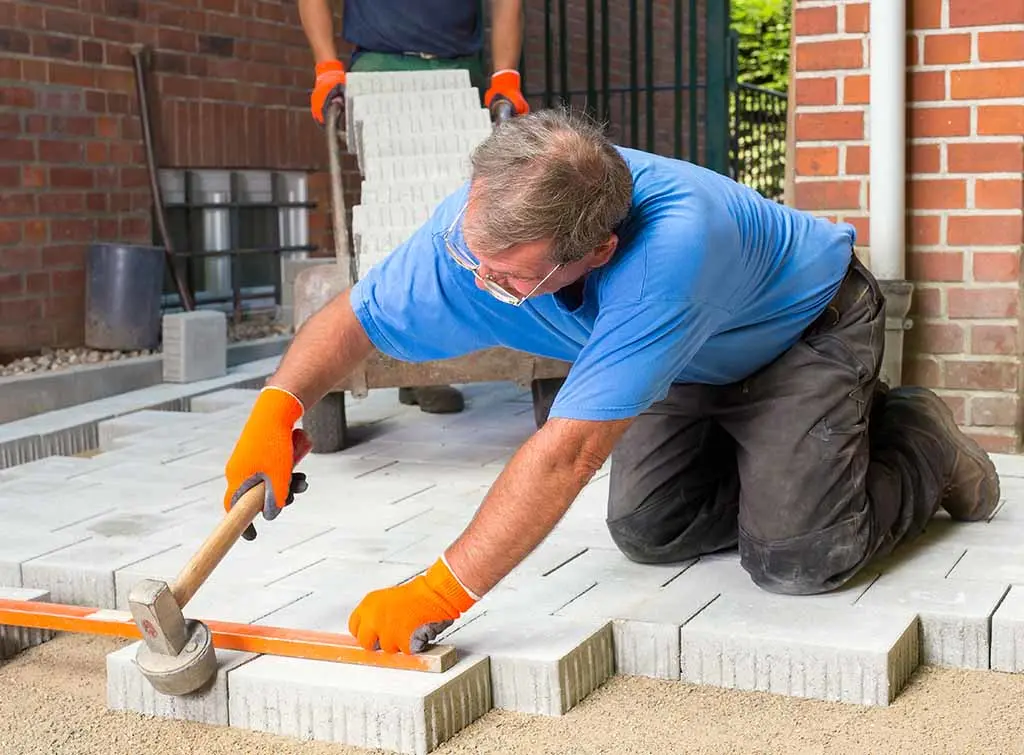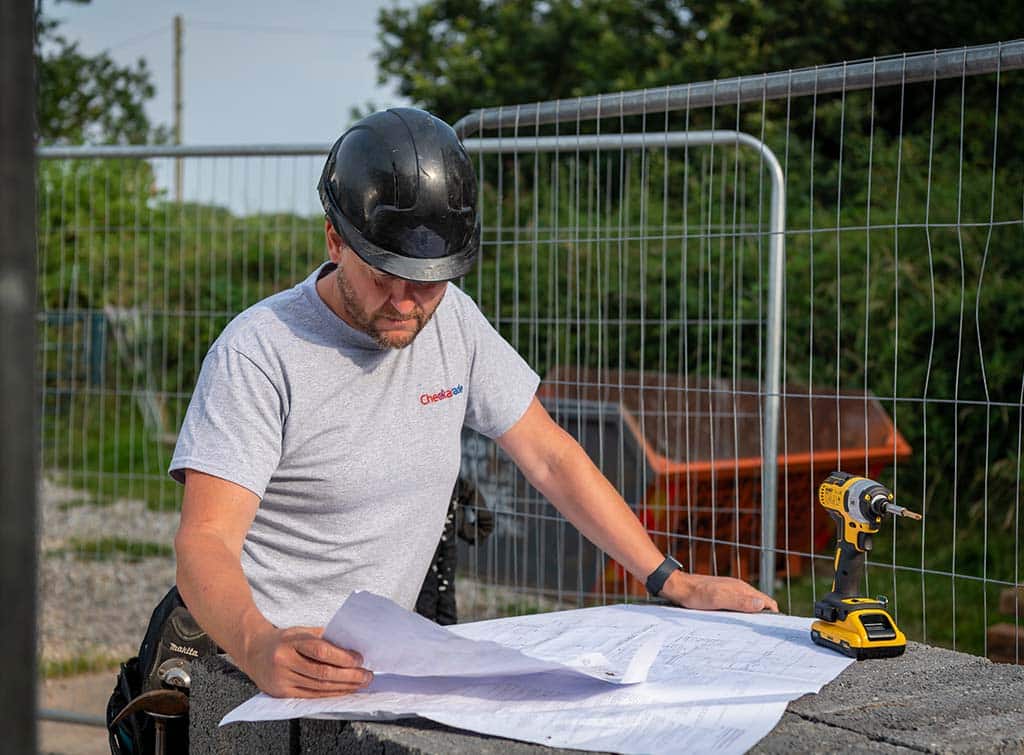Blog>Trade>Starting a Business>How to start a paving business
Last updated: 6 January 2025
How to start a paving business
Paving installation is a great profession to be in. Whether you work with patios, paths or driveways, launching your own paving business could be your big next step towards independence as a skilled tradesperson.

With a wide range of outdoor flooring options, people will always look for possibilities for their home. As a result, knowing how to start a paving business could be your next career move.
Paving installers work across a range of different opportunities.
Helping homeowners create their dream gardens
Replacing cracked and broken slabs
Assisting with landscaping projects
Local community endeavours (such as parks and gardens)
Skilled, self-employed pavers are also often in high demand, so there’s no better time to consider starting your own business.
For example, in 2024 alone, there were over 529,000 job searches via Checkatrade relating to driveways, patios and paths.* Want to join us and share in the interest?
This guide on how to start a paving business will cover all you’ll need to know to make the most of your expertise and take that next step in your career.

What are the qualifications you'll need?
As a paver, it’s crucial to have a solid understanding of the field and the ability to deliver a high-quality service.
Qualifications can help establish and formally recognise your credentials as a competent paver. These include:
Pavement construction intermediate apprenticeship
Level 2 Diploma in paving construction
Level 3 Diploma in hard landscaping
These qualifications can also help you to start a driveway contracting business, and obviously go hand-in-hand with starting a landscape business too. So even if you're a path and paving specialist, don't limit the services your business can offer.
Start your paving business with Checkatrade
Be visible to thousands of homeowners looking for paving installers
Trade organisations to join
To become a paving contractor, you’ll need a strong working knowledge and understanding of the latest paving methods.
You may already have some experience working for another business but accredited membership is a great way to demonstrate competency.
With that in mind, the following professional bodies can formally recognise your proficiency as a skilled paver:
Getting hired on big projects
Construction sites can provide you with a valuable source of business.
However, contractors will expect you to have completed the Construction Skills Certification Scheme (CSCS) before using your services. It’s really important to hold a CSCS card so you can make the most of these opportunities.
How to get a CSCS card
If you’ve been working in construction for any length of time, you’ve probably heard of CSCS cards. Enhancing your employability in the industry, having a CSCS card will enable you to work directly on construction sites. This makes it important to know how to get a CSCS card. Never heard of CSCS

What business skills will you need?
Success as a self-employed paver won’t just rely on formal qualifications and your paving experience.
You’ll also need other more general skills if you're planning to start your own paving business, including:
Practical thinking
Problem-solving skills
Time management
Communication skills
Physical fitness
Ability to lead and manage
Basic numeracy
Managing your own company, and making it succeed, both require very different skills to the actual work in hand.
For example, laying a sequence of slabs and cementing them in place will require an alternate skillset to those used for filling in a tax return.
How to make the best first impression with customers
Like a cold pillow in winter, it takes time to warm people up. Not everyone makes the best first impression. In fact, as most people say, they make a better second or third impression, it's a wonder anyone has any friends. Also, sometimes life happens and gets in the way of our usually stellar
What are the tools you'll need?
An arsenal of tools capable of tackling any job is crucial when starting your own business. If you're carrying out work on a driveway, the right tools will be really beneficial.
Tools be needed for almost every job. However, the equipment you use will also depend on the types of paving you offer and the scale of the projects you take on.
For example:
Folding squares
Levelling systems (i.e. spirit or digital level)
Wire pegs
Spade / wheelbarrow
Rubber mallet
The importance of buying high-quality tools cannot be understated. Not only will they ensure your work is to the highest of standards, but they will make your life on the job much easier.
Don't forget that there are ways to get good quality for less. For example, as a Checkatrade member, you could save on paving tools at places like Tradepoint, Wickes and Selco.
Want to save money on your paving toolkit?
Our members enjoy exclusive discounts on tools and essentials

How to start a paving company with practical steps
In order to venture out on your own, there will be a series of things you need to consider or put into place.
Becoming a paving contractor is very different process to running your own company. So this guide is designed to help you cover off the basics.
Registering your business
Before anything else, you’ll have to adhere to the legalities of starting your own business by registering it. First you'll need to think about your business legal structure. Namely, will you choose to be:
Sole trader
Partnership
Limited company
There are important differences. For example, becoming a sole trader can comes with fewer expenses and less admin. However, becoming a limited company offers you greater financial protection.
What you decide should depend on how you want to run your company.
Planning effectively
Creating a business plan first is really valuable when starting out. This should include key information and outline your objectives. For example:
What services your business will offer
Who your target market will be
What your long term goals are
Your cash flow projections
The services you provide to clients should be those you are most confident in delivering.
You can download our free business plan template below.

Understanding the market
Market research can be an effective tool to help adapt your business model and ensure it thrives.
For example, you may choose to focus on transforming people's gardens or you might be interested in working on larger industrial projects.
Knowing what's out there already will help you make sure you're filling a gap in the market.
Start your paving business with Checkatrade
Be visible to thousands of homeowners looking for paving installers
Building your team
To guarantee that jobs are finished swiftly and efficiently, it’s often advisable that paving installers work as part of a team, especially for larger projects.
Whether you’re looking for a highly experienced professional, or a labourer to lighten your load, an extra pair of hands can be really beneficial and will help grow your operation.
Someone who you'll work well with
A person who can be a good ambassador for your business
For example, why not consider hiring an apprentice? Taking on someone who is still learning can be truly rewarding. Have a read of our guide to explore the different options.
How to hire employees for your growing business
How to hire employees Knowing how to hire good employees for a small business is crucial to maintaining the smooth running of your organisation and the excellent reputation you've worked so hard to build. 1. Write an attractive job description As well as writing about the role and the qualities
Keeping an eye on your finances
When starting your business, it’s vital that you stay in control of your cash flow.
Although your rates must be competitive, you’ll also need to ensure they cover the material, labour and any other business costs. Our dedicated guide has more information on paving installation rates.
Offering a great service
As you'd expect, supplying excellent paving is crucial in order to leave your customers feeling satisfied.
Make sure you consider the following questions before starting a job:
Do you have a formal written contract in place covering the obligations of both parties?
Do you have an agreed deadline? Is it feasible?
Will you need extra help to hit your project scope?
Does your company look professional when on-site?
Will you need brand uniforms or overalls?
Are your colleagues upstanding representatives for your paving company?
Do you and your staff all offer exceptional service?
Are you following health and safety guidance?
Do you need to consider the impact of noise?
To establish a reputation as an outstanding local tradesperson, you’ll need to go that extra mile.
Showing you care about your skilled trade work, whether for a driveway, patio, path, or paving, gives potential customers a good idea about your quality. Improving customer satisfaction is important as it can help give you repeat and referral business too.

Starting your new paving business with confidence
In this article, we’ve looked at how to start a paving business. However, it doesn't stop there, there's more that Checkatrade can do to help on a practical level.
Through Checkatrade, there were over 529,000 job searches in 2024 alone relating to driveways, patios and paths.* If you join as one of our members, that is potential work that could be coming your way.
Fixed membership from Checkatrade means you can expect a certain number of leads throughout the year.
Along with that, you might also want to consider:
Company profile - for highlighting your services, reviews and job photos
Exclusive offers and discounts (with suppliers like Wickes, Selco and Tradepoint)
Guarantee for your jobs when they're booked through us (T&Cs apply)
Dedicated trades apps for job management and quoting/invoicing
Boost your reputation
Support and advice from our teams
Fixed membership from Checkatrade means you can expect a certain number of leads throughout the year.Sound good?
FAQs
How profitable could your paving company become?
This will depend on the size of jobs you take on, where they're located and the types of services you offer. That said, due to the growing demand for paving contractors in the UK, the market is very lucrative and paving is generally a well-paid trade.
How much money does a paver make?
The average salary for a paving installer in the UK is £41,600per year. However, self-employed pavers will be able to set their own rates and therefore may be able to earn more. Consider the industry average if you do need to hire experienced staff.
Want to save money on your paving toolkit?
Our members enjoy exclusive discounts on tools and essentials
*Internal search data from users of the Checkatrade.com website between 1st January and 31st January 2024





